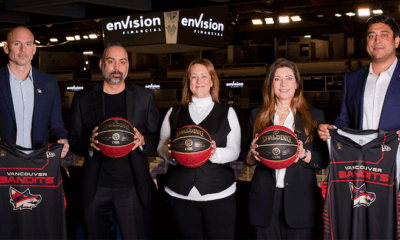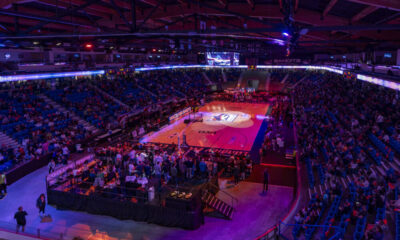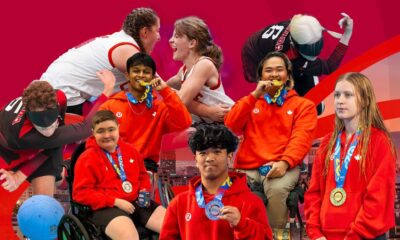The first part focused on Lori’s love for the game that advanced her to a higher level of the game and part two will focus on her advancement. Enjoy her story!!
Clarke finished her second season at Eastern Washington, but a change of heart was already in progress.
After two years with the Eagles, Clarke returned to Canada with hopes of carving a name for herself on the Canadian university basketball scene and a clear ambition to one day make the Canadian national team.
“I saw how great the Vikettes were and they had this great female coach, Kathy Shields. And of course, I had some friends on the team that I had played with on the provincial team, and I’m like, ‘Oh my God. I’m going to UVic,’” Clarke said.
Clarke was given a mandatory redshirt upon her arrival, where she spent the majority of the year on the practice squad learning a new system which, at times, had her working in the post.
The Vikettes placed fourth in the Canada West conference to finish the 1983-84 season; a modest result for a team that lost a number of players to graduation the year prior.
Despite the humbling transition, Clarke’s best years were about to begin.
Her resume speaks for itself: two national titles in 1985 and 1987, a three-time Canada West all-star and the second highest points per game average in school history.
In Clarke’s senior year with the Vikettes, she was named a CIAU first team All-Canadian, and was awarded the Nan Copp Award as Canada’s university player of the year.
Today, Clarke remains one of only five players in University of Victoria history to have won the award.
Clarke was on the fast-track toward stardom and couldn’t help but feel bullish about her future basketball career.
However, it wasn’t always easy playing under legendary head coach Kathy Shields. Practices were typically more difficult than games, sometimes to a breaking point.
Shields wanted to make sure her players could handle the pressure when the game got tough. But above all, Shields was understanding.
“She’s the best coach I ever played for,” Clarke said. “She was the right combination of tough and kind. We knew she cared about us as athletes and as humans because if we ever came to her with a human problem, it was more important than our performance on the court.”
In 1985, the Canadian senior women’s tryouts were taking place in Toronto and Clarke had already been cut six times from previous Junior A and B selection camps.
The competition was fierce and for twice a day Clarke was going head-to-head against other invitees, hoping to secure a coveted roster spot. As training camp came to a close, head coach Wayne Hussey took Clarke over to a corner and gave her the news.
At 21-years-old, Clarke had made Team Canada and stated “I was so shocked. I couldn’t even understand what he said. I was sure I was going to be cut,”
Clarke continued “I said, ‘Can you say that again?’ I just started crying because I was so happy that I made the team because I wanted it so bad.”
Clarke became a staple on the national team for seven years, highlighted by a bronze medal at the 1986 FIBA World Championships – which remains tied for the best finish ever by a Canadian national women’s basketball team at the tournament. Clarke later served as captain for the red and white at the 1990 World Championships.
When she wasn’t representing her country, Clarke made the jump overseas, playing two years in France and another four in Germany.
Her knees and calves began to feel the wear from nearly two decades of dedicating her mind and body to basketball.
In hindsight, she “probably shouldn’t have” gone back. But the love for the game was still there, so she returned to Berlin in 1993 for another season.
It was the last one Clarke ever played.
“I just realized my body was starting to break down,” Clarke said. “I could keep fighting it, keep pushing it, but I thought, ‘You know what, for the health of my future life of dancing, walking, riding my bike – it’s time.’”
With her playing days finished, a life devoted previously to the hardwood was now spent on the sidelines coaching.
First, in Aschaffenburg, Germany – which lasted only a year. In 1997, Clarke agreed to join University of British Columbia (UBC) head coach, and close friend,
Deb Huband’s coaching staff, where she spent three years balancing duties as an assistant coach while working towards her teaching degree.
Clarke retired from coaching in 2018 following 14 years as the girl’s basketball coach at Prince of Wales Secondary.
After moving away from Vancouver in 2019, she and her wife, Peggy, now live along the province’s Sunshine Coast.
When they lived in the city, the sports-loving couple often found themselves at the UBC’s War Memorial Gymnasium on Friday and weekend nights watching Thunderbirds basketball games.
Nowadays, without the entertainment of live sports, Clarke has been laying low – enjoying the quietness that comes with the indecisiveness of life during a global pandemic.
In the end, her passion still glows, as it did back in Abbotsford years ago, through the players she’s coached.
And hopefully, through the next generation of young girls in her community who pursue basketball for the same reasons she did – for the love of the game.
For further information please contact Andrew Savoy with the Abbotsford Bandits with the Canadian Elite Basketball League
Thanks to Andrew Savoy with the Abbotsford Bandits for the press release.








